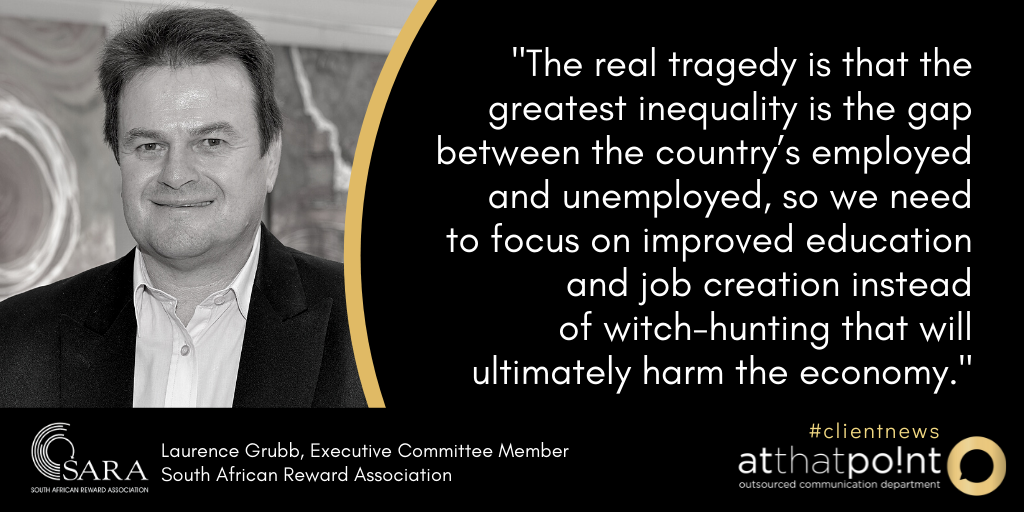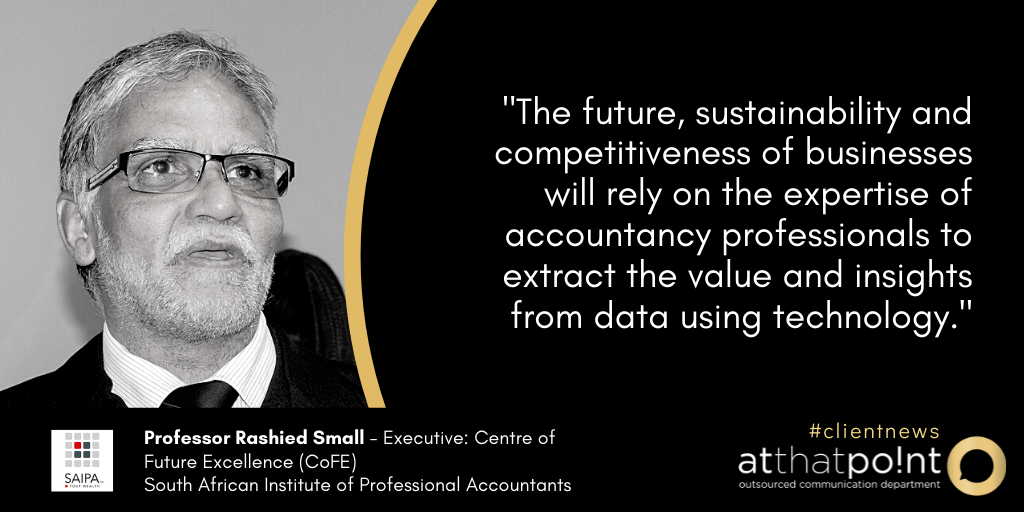|
The Draft Companies Amendment Bill (the Bill), 2021, has been published by the Minister of Trade, Industry and Competition for public comment.
“One objective of the Bill is to make it easier to do business in South Africa, but its onerous remuneration disclosure requirements could turn foreign companies away,” says Laurence Grubb, Master Reward Specialist and executive committee member at the South African Reward Association (SARA). While the Association endorses fair remuneration practices, especially at the executive level, Grubb questions the timing and rationale of the proposed amendments. What is fair? The reasoning behind the proposed changes to the Bill is that they will help tackle the perceived injustice of excessive pay that has contributed to the country’s inequality. Yet, the Bill offers no indication of what is meant by “excessive”, and the use of the word in the introduction is emotive and creates the impression that this is a widespread common problem. Excessive is not defined, is a subjective term and therefore it is difficult to know what excessive pay is and who is paid excessively. Shareholder empowerment The one positive aspect of the Bill is that rather than using laws to cap executive pay, it advocates increased disclosure and the response of shareholders. Public companies and SOEs will be compelled to publish details of the gap between the top 5 percent highest-paid and bottom 5 percent lowest-paid employees. This is contrary to previous proposals to use the Palma ratio, i.e. the top 10 percent versus the bottom 40 percent, which is statistically considered to be a more reliable measure. These figures will be exposed to shareholders when they vote for or against the executive remuneration policy and implementation report at the organisation’s AGM. Without a 50 percent approval on these votes, proposed to be ordinary and binding resolutions, neither can be implemented. Moreover, if the policy is not approved and cannot be implemented, this means a delay until approval is obtained from the shareholders. Who is to be held to account if an excellent CEO leaves because the share scheme was not approved and hence no shares can be awarded? The implications for a ‘no’ vote on the implementation report are even more onerous. The entire remuneration committee (Remco) must step down. Does this mean from the Remco or the Board? The shareholders do not vote on the Remco appointments. Rather, the Board appoints the Remco members. Nothing is said about what must happen next. Does the company continue until the next AGM without a Remco? Can the removed members be re-elected? Must the Board appoint a new Remco from its remaining members? What happens if the Chair of the Board is a member of the Remco – when the Remo steps down it not only leaves the Board without a Chairman but also leaves other Committees without members which may cause problems in terms of being quorate. The implications for shareholders may scare them from voting against either resolution because of the consequences. Either way, it makes for uncertain, dangerous, high risk resolutions which may make companies wary of proposing changes and certainly cannot be seen as investor friendly. Consequences The effect of these and other disclosure requirements set forth in the Bill may dissuade foreign companies from investing or remaining on our shores and cause local businesses to seek alternative measures. “The government needs to realise that companies are not compelled to do business in South Africa,” warns Grubb. Rather, they may choose to relocate their head offices abroad where their executives are not affected by the new legislation. They may also reduce or outsource their lowest-earning staff to shrink the pay gap. Worse, they could simply seek out more favourable regions where it really is easier to do business and bypass South Africa altogether. “The real tragedy is that the greatest inequality is the gap between the country’s employed and unemployed, so we need to focus on improved education and job creation instead of witch-hunting that will ultimately harm the economy,” concludes Grubb. ENDS MEDIA CONTACT: Rosa-Mari Le Roux, 060 995 6277, [email protected], www.atthatpoint.co.za For more information on SARA please visit: Website: www.sara.co.za Twitter: @SA_reward LinkedIn: South African Reward Association Facebook: SARA – South African Reward Association
0 Comments
The National Income Dynamics Study – Coronavirus Rapid Mobile Survey (NIDS-CRAM) is a study tracking income, employment and welfare in South Africa. The report reveals that women have been hardest hit by the impact of COVID-19 lockdowns.
“Although survival and saving jobs is paramount, equal pay initiatives within organisations have not been forgotten,” says Dr Mark Bussin, Master Reward Specialists and Executive Committee Member of the South African Reward Association (SARA). “However, we need equity programmes that extend beyond the enterprise.” The current economic slump has affected women so badly, it has been dubbed the “shecession”. Job losses The NDIS-CRAM survey reports that, of the three million jobs lost between February and April 2020, two million had been held by women. Between April and June 2020, employment increased by 3.2% (220,000 jobs) for women and 3.5% (320,000 jobs) for men. Yet, in June 2020, women remained well behind men in returning to pre-COVID employment levels. Income support According to the study, 57% of those unemployed in June 2020 were women. However, they accounted for only 41% of TERS/UIF-TERS beneficiaries and only 34% of those were paid the Social Relief of Distress Grant (SRDG) in that month. Industries The report suggests a number of contributing factors to the high level of unemployment among women. For one, many industries with high female employee counts were forced to reduce staff during the lockdown. These include childcare, personal grooming and hospitality. Another is their being employed in jobs where working from home is not possible or not being able to work the same hours due to childcare needs. Childcare Women often bear the greater share of childcare and healthcare responsibilities in the family. After early childhood development services and schools closed under lockdown, many may have been unable to work effectively while caring for their family. Due to divorce, women are also more likely to live with children than men are. In the report, 67% of women and only 25% of men reported they were looking after children themselves. Lower earners With no chance of daycare, many families had to decide which parent would leave their job to take care of their children. Since women typically earn less than men, they are the obvious candidates. This situation is unfortunately a result of existing inequality in pay between genders. Within the enterprise Although the study acknowledged a large difference between male and female incomes before February 2020, it measured no significant increase in the gap between then and June 2020. “In my view, the pay gap has not worsened because of COVID. It is still around and still present at the same levels as before,” says Bussin. Conclusion The NDIS-CRAM study suggests that one possible solution is state-subsidised childcare at reopened schools. This will help women to increase their work hours and return to their previous earning potential. In addition, Bussin advises that organisations also need to do due diligence internally. “All organisations should conduct regular, thorough audits of all remuneration and HR practices to make sure that no poor practices or discrimination have crept in,” he says. ENDS MEDIA CONTACT: Rosa-Mari Le Roux, 060 995 6277, [email protected], www.atthatpoint.co.za For more information on SARA please visit: Website: www.sara.co.za Twitter: @SA_reward LinkedIn: South African Reward Association Facebook: SARA – South African Reward Association |
Archives
March 2023
Welcome to the South African Reward Association newsroom.
Categories
All
|



 RSS Feed
RSS Feed